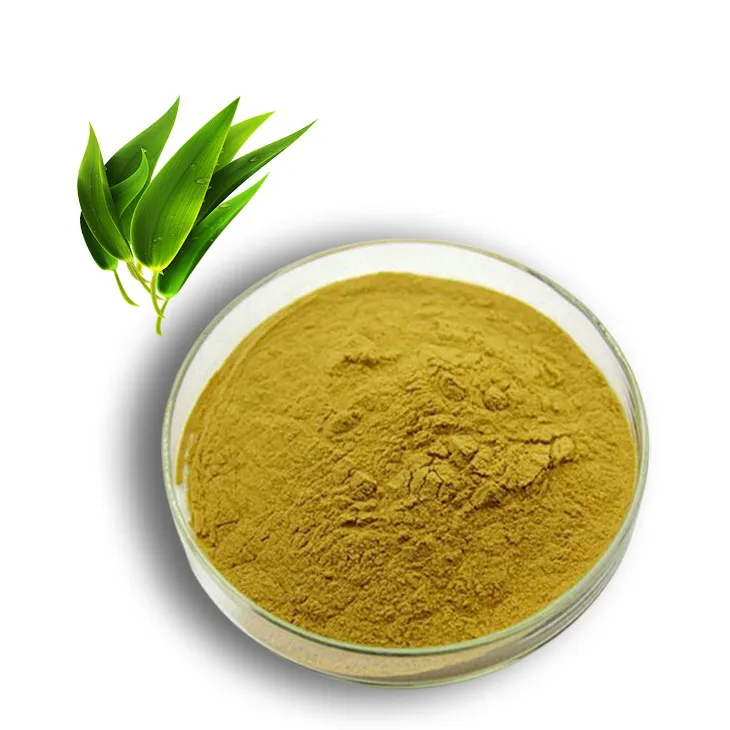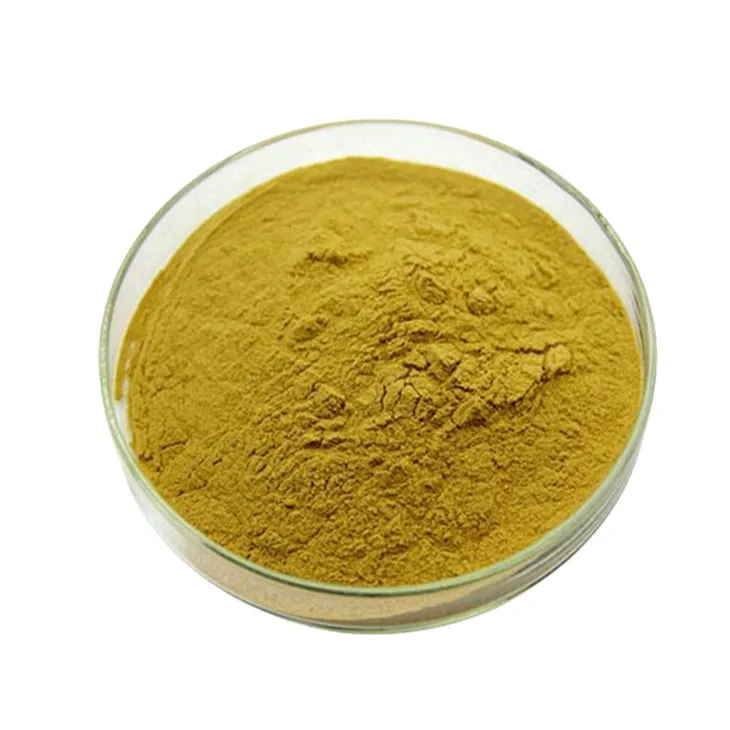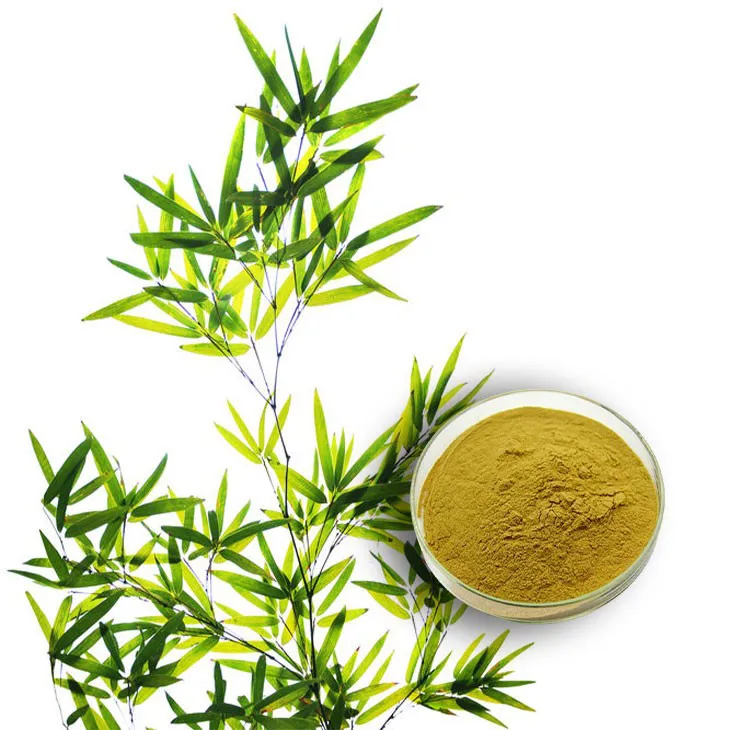- 0086-571-85302990
- sales@greenskybio.com
Bamboo Leaf Extract: Is the extract effective for weight loss?
2024-11-13

1. Introduction
In the quest for effective weight loss solutions, many natural substances have come under the spotlight. Bamboo Leaf extract is one such contender that has been garnering attention in recent years. With the growing interest in natural and holistic approaches to health and wellness, understanding whether Bamboo Leaf extract can truly aid in weight loss is of great importance.
Bamboo, a plant known for its versatility and rapid growth, has been used in traditional medicine in various cultures for centuries. The extract from its leaves is rich in bioactive compounds, which are hypothesized to have multiple effects on the body that could potentially contribute to weight management.

2. Composition of Bamboo Leaf extract
Bamboo leaf extract contains a diverse range of compounds. One of the key components is flavonoids. These are polyphenolic compounds that are known for their antioxidant properties. In bamboo leaves, flavonoids such as orientin and isoorientin are present in significant amounts.
Another important group of compounds found in bamboo leaf extract is phenolic acids. These acids play a role in various physiological processes within the body. Additionally, the extract also contains alkaloids, which have been the subject of much research due to their potential biological activities.
The presence of these bioactive compounds in bamboo leaf extract is what makes it a potentially interesting candidate for weight loss studies. Each of these components may interact with the body's systems in different ways, which could ultimately affect weight.

3. Impact on Metabolism
3.1. Thermogenesis
One way in which bamboo leaf extract might contribute to weight loss is through an increase in thermogenesis. Thermogenesis is the process by which the body generates heat, and an increase in this process can lead to an increase in energy expenditure. Some of the compounds in bamboo leaf extract, such as flavonoids, have been shown in preliminary studies to potentially enhance thermogenic activity in the body.
When the body's thermogenic activity is increased, it burns more calories at rest. This is similar to the effect of stimulants like caffeine, but without the potential negative side effects associated with some artificial stimulants. For example, a study on rodents showed that a certain concentration of bamboo leaf extract led to an elevation in body temperature, indicating increased thermogenesis. However, it is important to note that more research is needed to confirm these effects in humans.
3.2. Regulation of Metabolic Pathways
Bamboo leaf extract may also play a role in regulating metabolic pathways. The body has complex metabolic networks that are involved in the breakdown and utilization of nutrients. Compounds in the extract could potentially interact with enzymes and signaling molecules within these pathways.
For instance, some phenolic acids in the extract might influence the way the body processes carbohydrates and fats. They could enhance the breakdown of fats into smaller molecules that can be more easily used for energy production. This would lead to a reduction in fat storage and potentially contribute to weight loss. However, the exact mechanisms by which this occurs are still not fully understood and require further investigation.

4. Effect on Appetite
4.1. Satiety Signals
Another aspect to consider when looking at the potential weight - loss benefits of bamboo leaf extract is its effect on appetite. Some studies suggest that certain compounds in the extract may influence the body's satiety signals. Satiety is the feeling of fullness that helps regulate food intake.
Flavonoids in bamboo leaf extract might interact with the hormones and neural pathways involved in satiety. For example, they could stimulate the release of hormones like leptin, which signals to the brain that the body has had enough to eat. By enhancing satiety, bamboo leaf extract could potentially reduce overall food consumption, which is a key factor in weight loss.
4.2. Cravings
In addition to affecting satiety, bamboo leaf extract may also have an impact on food cravings. Cravings for high - calorie, sugary or fatty foods are often a stumbling block in weight loss efforts. Some components of the extract could potentially modulate the brain's reward system, which is involved in cravings.
By reducing cravings for unhealthy foods, individuals may be more likely to stick to a balanced diet, which is essential for long - term weight management. However, at present, the evidence for this effect is limited and more research is needed to establish a clear link between bamboo leaf extract and the reduction of food cravings.

5. Role in Fat - Burning
5.1. Lipolysis
Fat - burning, or lipolysis, is a crucial process in weight loss. Bamboo leaf extract may have a role to play in promoting lipolysis. The bioactive compounds in the extract could interact with fat cells, or adipocytes, to trigger the breakdown of stored triglycerides into free fatty acids and glycerol.
In vitro studies have shown that certain compounds in bamboo leaf extract can stimulate lipolytic activity in adipocytes. However, in vivo studies in humans are required to confirm whether these effects translate into actual fat loss in the body. It is also important to consider that the body has its own regulatory mechanisms for lipolysis, and any potential effect of the extract would need to work within these existing systems.
5.2. Prevention of Fat Accumulation
In addition to promoting lipolysis, bamboo leaf extract may also help prevent fat accumulation. This could occur through multiple mechanisms. For example, as mentioned earlier, by influencing metabolic pathways involved in fat metabolism, the extract could reduce the amount of dietary fat that is stored in the body.
It could also potentially affect the behavior of pre - adipocytes, which are cells that can develop into mature fat - storing adipocytes. By inhibiting the differentiation of pre - adipocytes, bamboo leaf extract may limit the overall number of fat cells in the body, thereby preventing excessive fat accumulation.
6. Safety and Side Effects
When considering the use of bamboo leaf extract for weight loss, it is crucial to also examine its safety profile. Generally, bamboo leaf extract is considered safe when consumed in moderation. However, as with any supplement, there may be potential side effects.
Some individuals may experience mild gastrointestinal discomfort, such as nausea or diarrhea, when taking bamboo leaf extract. This could be due to the body's individual response to the bioactive compounds in the extract. Additionally, since the long - term effects of bamboo leaf extract on human health are not fully known, caution should be exercised, especially for those with pre - existing medical conditions or those taking other medications.
For example, if an individual has a liver or kidney disorder, the use of bamboo leaf extract should be carefully monitored as the extract is metabolized and excreted by these organs. It is always advisable to consult a healthcare professional before starting any new supplement for weight loss.
7. Current Research and Limitations
Current research on the effectiveness of bamboo leaf extract for weight loss is still in its early stages. While there have been some promising in vitro and animal studies, human trials are relatively scarce.
One of the main limitations of the existing research is the lack of standardized extraction methods for bamboo leaf extract. Different extraction methods can result in extracts with varying compositions of bioactive compounds, which can make it difficult to compare results across studies.
Another limitation is the relatively small sample sizes in many of the studies conducted so far. Larger - scale human trials are needed to accurately assess the potential weight - loss effects of bamboo leaf extract, as well as its safety over longer periods of time.
8. Conclusion
In conclusion, bamboo leaf extract shows some potential as a weight - loss aid. Its bioactive compounds may have an impact on metabolism, appetite, and fat - burning processes. However, at present, the evidence is not conclusive, and more research is needed.
While the idea of using a natural extract like bamboo leaf extract for weight loss is appealing, it is important to approach it with caution. Safety considerations, along with the need for more comprehensive research, should be taken into account. Until more conclusive evidence is available, individuals should not rely solely on bamboo leaf extract for weight loss but should instead focus on a balanced diet and regular exercise as the foundation of a healthy weight - management plan.
FAQ:
Question 1: What is bamboo leaf extract?
Bamboo leaf extract is a substance obtained from bamboo leaves. It contains various bioactive compounds such as flavonoids, phenolic acids, and polysaccharides. These components are believed to have potential health - related properties.
Question 2: How could bamboo leaf extract potentially affect metabolism?
Some studies suggest that the bioactive compounds in bamboo leaf extract may influence metabolic processes. For example, flavonoids could interact with enzymes involved in energy metabolism. However, more research is needed to fully understand the exact mechanisms and the extent of its impact on overall metabolism.
Question 3: Does bamboo leaf extract help suppress appetite?
There is currently limited evidence directly indicating that bamboo leaf extract can suppress appetite. While some of its components might have an impact on hormonal regulation related to hunger and satiety, conclusive proof in this regard is yet to be established.
Question 4: Can bamboo leaf extract directly promote fat - burning?
Although some in - vitro studies have shown that certain compounds in bamboo leaf extract may have an effect on fat cells, it doesn't necessarily mean it directly promotes fat - burning in the human body. In - vivo studies are required to determine if and how it can actually contribute to the breakdown of body fat.
Question 5: Are there any side effects of using bamboo leaf extract for weight loss?
As of now, the long - term side effects of using bamboo leaf extract specifically for weight loss are not well - known. However, like any supplement, it may cause allergic reactions in some individuals, or it could interact with medications. It's always important to consult a healthcare professional before starting to use it.
Related literature
- Bamboo Leaf Extract: Composition, Bioactivities and Potential Applications"
- "The Metabolic Effects of Plant - Based Extracts: A Focus on Bamboo Leaf"
- "Investigating the Role of Bamboo Leaf Extract in Appetite Regulation"
- ▶ Hesperidin
- ▶ citrus bioflavonoids
- ▶ plant extract
- ▶ lycopene
- ▶ Diosmin
- ▶ Grape seed extract
- ▶ Sea buckthorn Juice Powder
- ▶ Beetroot powder
- ▶ Hops Extract
- ▶ Artichoke Extract
- ▶ Reishi mushroom extract
- ▶ Astaxanthin
- ▶ Green Tea Extract
- ▶ Curcumin Extract
- ▶ Horse Chestnut Extract
- ▶ Other Problems
- ▶ Boswellia Serrata Extract
- ▶ Resveratrol Extract
- ▶ Marigold Extract
- ▶ Grape Leaf Extract
- ▶ blog3
- ▶ blog4
- ▶ blog5
-
Organic Tongkat Ali extract powder factory.
2024-11-13
-
How to make powder with ashwagandha extract.
2024-11-13
-
Rosehip extract manufacturers from China.
2024-11-13
-
The best cat's claw extract in nature.
2024-11-13
-
Chinese Dandelion Leaf Extract Suppliers.
2024-11-13
-
Stevia Extract
2024-11-13
-
Kupilu Extract
2024-11-13
-
Acai Berry Extract
2024-11-13
-
Maitake Mushroom Extract
2024-11-13
-
melatonin extract
2024-11-13
-
Lavender Extract
2024-11-13
-
Nettle leaf extract
2024-11-13
-
Thunder God Vine Extract
2024-11-13
-
Lycopene
2024-11-13
-
Cat Claw Extract
2024-11-13





















